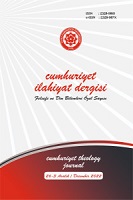Kant’ın Eleştirel Felsefesinde Teleolojiden Teolojiye Geçişliliğin İmkânı
The Possibility of Transition from Teleology to Theology in Kant’s Critical Philosophy
Author(s): Ayşe Hilal AKINSubject(s): Metaphysics, Ethics / Practical Philosophy, German Idealism, Philosophy of Religion
Published by: Cumhuriyet Üniversitesi İlahyat Fakültesi
Keywords: Critical Philosophy; Kant; Telos; Teleology; Purposiveness;
Summary/Abstract: In this study, teleological judgments were examined as having a part of the boundless relationship of reason with the universal and unconditional, based on Kant's critical philosophy. To do this, firstly, the distinction between telos and skopos has been pointed out. The cognitive faculties of the subject as the source of finality in nature and the concepts of purposeless purposefulness were discussed. We emphasized that according to Kant's critical philosophy, the introduction of the concept of God as an internal principle to natural science would be characterized as false belief. This trespassing, which causes a narrative that goes beyond the limits of our knowledge, was discussed in the context of the processes of acquiring knowledge in Kant's philosophy. In this regard, according to Kant the nature of the transition from teleological judgments to theological judgments was investigated. At the beginning of the study, the relation of telos with infinity was discussed. Afterward, the idea of purposefulness, which organizes itself in nature and eliminates blind randomness, was emphasized. The basis of the teleological principle as the inner principle of natural science was analyzed. The possibility of placing the concept of God on this very ground was discussed. It was pointed out that the characteristics of universality and necessity that Kant attributed to purposefulness were not only based on the grounds of experience. At this point, it was stated that to achieve universality, it is necessary to base on an a priori principle at the same time. The possibility that this principle could be an intention (Alm. Absicht) or a final end (Alm. Endzweck) was discussed. We focused on the request of the reason, which is applied to the conditioned and the finite, to reach the unconditional. It was stated that for Kant, the reason for the transition from teleological judgments to theological judgments was the effort to see purposeful regularity in phenomena. It was pointed out that it is a necessary step of the mind to lead this regularity to a higher telos and even to a creator, to the first being. We emphasized that concerning Kant’s critical philosophy if the concept of God was placed on the ground of natural science and the purposefulness in nature would be explained with this, and this method was used to prove the existence of God that would create an internal and non-permanent narrative. It was discussed whether this claim was an illusion. At this point, the task of the imagination performed with telos was examined. Evaluations about the concept of telos as the common ground of the subjective and the universal were included. As a result, it has been investigated how the search for the constant existing in the human mind can lead him to the existence of a God in the chain of causality.
Journal: Cumhuriyet İlahiyat Dergisi
- Issue Year: 26/2022
- Issue No: 3
- Page Range: 1037-1051
- Page Count: 15
- Language: Turkish

